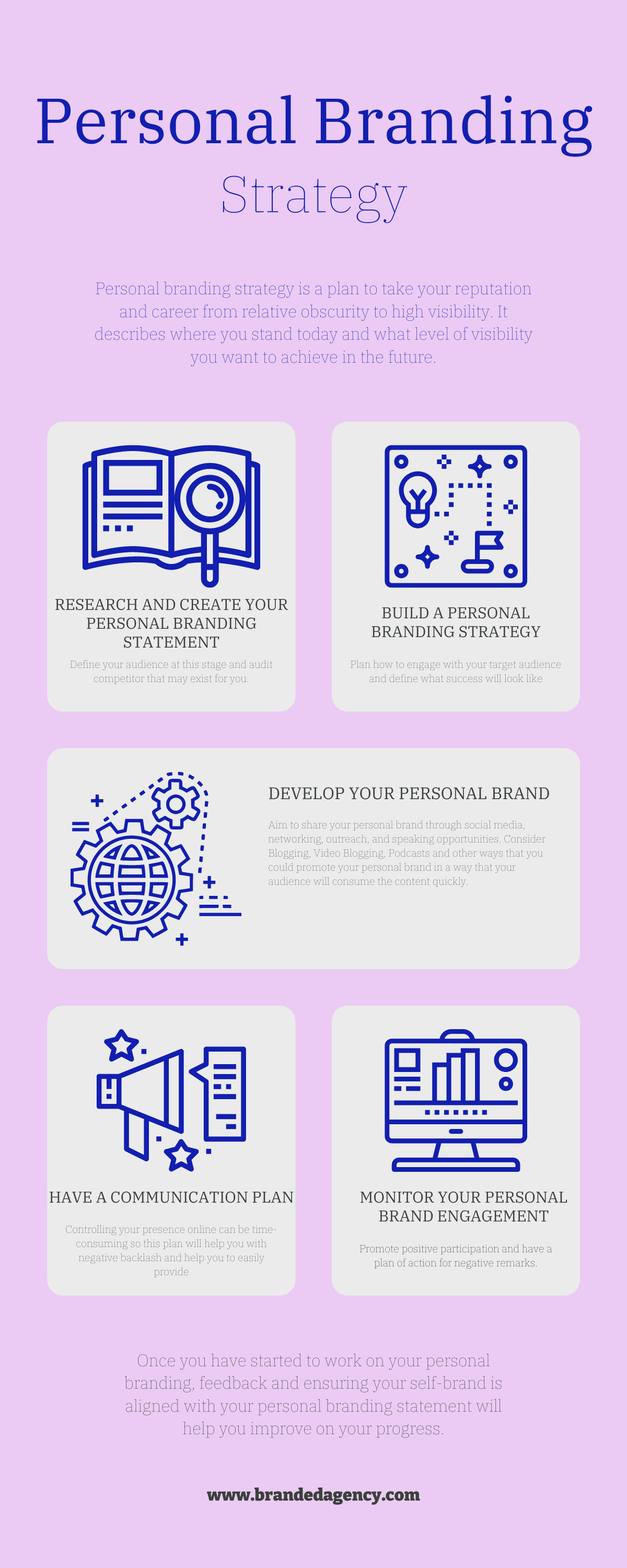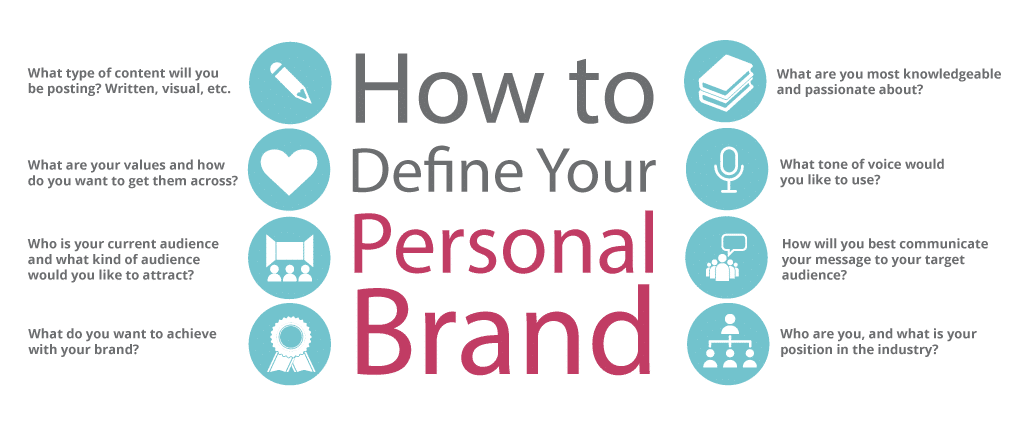Personal Branding has become an indispensable part of professional growth and personal development in today’s digital era. It represents the process of marketing oneself and one’s career as a brand, creating content, and encompassing the creation of a distinct image and reputation in the mind of others. The concept, although not new, has gained unprecedented importance with the advent of the internet and social media, providing individuals with platforms to project their personal brand to a global audience.

The roots of personal branding can be traced back to the late 20th century, with the term itself gaining prominence through Tom Peters’ 1997 article “The Brand Called You” in “Fast Company”. Peters argued that individuals must become the marketers of their own unique skills and abilities as traditional job security faded. This was the dawn of understanding that everyone has a personal brand, whether they consciously cultivate it or not.
In the digital age, personal branding has evolved beyond mere self-promotion, becoming a strategic tool for individuals to differentiate themselves in a crowded market, build credibility, and achieve career goals. The importance of personal branding today lies in its capacity to open doors to opportunities, foster trust, and establish a person’s authority in their field.
The Components of Personal Branding
1. Identity and Image

The foundation of personal branding lies in a deep understanding of one’s identity and how it is perceived by others. It’s about aligning your internal values, strengths, and passions with the external image you project. This alignment is crucial for authenticity, which resonates with your audience. Tools like the Johari window can help individuals gain insights into their own and others’ perception of them, laying the groundwork for a solid personal brand.
2. Consistency
Maintaining consistency in the development and management of personal brands is critical for establishing a uniform presence across different channels and modes of communication. This strategic approach in personal branding ensures that individuals present a coherent and trustworthy image, one that audiences can easily recognize and rely upon. Whether through the specific tone of voice used, the visual design elements selected, or the core messages conveyed, achieving consistency is central to reinforcing the identity of personal brands.
It simplifies the process for your audience, enabling them to grasp and recall what you represent and the values you embody more efficiently. The significance of consistency in personal branding cannot be overstated, as it plays a pivotal role in building a solid foundation for your brand’s identity. It makes personal branding important by ensuring that every interaction—be it on social media accounts, professional networks, or personal blogs—echoes the same principles and qualities, presenting a unified brand to the world.
For instance, personal branding examples often highlight how successful individuals use a consistent personal branding strategy across their social media accounts to amplify their visibility and impact. This level of uniformity in personal branding helps cultivate a sense of familiarity and trustworthiness among audiences, reinforcing why consistency is not just a choice but a necessity in crafting influential personal brands.
3. Authenticity
Authenticity signifies a conscious and intentional effort to remain true and open about your identity, values, and convictions. It involves a commitment to transparency, where you unabashedly reveal your genuine self, encompassing both your strengths and areas of vulnerability. This level of honesty plays a pivotal role in establishing meaningful and deeper connections with your audience. By presenting an authentic image, you lay the groundwork for a more effective personal brand, one that resonates with people on a personal level.
Authenticity is the cornerstone of building a successful brand, especially in the digital age where audiences are increasingly savvy and seek genuine interactions. Social media influencers, for example, have mastered the art of authenticity, using it as a key strategy to attract and maintain their followers. They understand that being relatable and true to oneself not only fosters trust and reliability among their audience but also sets the foundation for professional success.
Indeed, the authenticity in one’s personal branding journey is an indispensable element in cultivating lasting relationships, both with audiences and professional peers. It’s this genuine approach that transforms a personal brand into a powerful tool for engagement, allowing individuals to stand out in a crowded marketplace. When authenticity is prioritized, it ensures that your personal brand is not just a facade, but a true reflection of who you are, making your message more impactful and your brand more enduring. This approach underscores the importance of authenticity in the creation and maintenance of effective personal brands, highlighting its role as a critical component for achieving professional success and establishing a successful brand that is both trustworthy and relatable.
4. Visibility
Boosting your visibility requires a strategic approach to ensure you’re seen by the appropriate audience, at the optimal moment, and via the most effective channels. Achieving this visibility can be accomplished through a variety of avenues, including leveraging social media platforms, engaging in speaking opportunities, contributing to publications, and actively participating in networking events.
The essential component of this strategy is to provide meaningful content and insights that demonstrate your expertise while simultaneously offering assistance to others. This approach not only amplifies your presence but also strengthens your personal brand by showcasing your value and expertise to the community.
5. Networking
Networking encompasses the deliberate process of forming and nurturing relationships that contribute positively to both your personal development and professional advancement. It revolves around the concept of forging connections with peers within your field, exchanging valuable knowledge, and extending support without anticipating immediate rewards. By engaging in meaningful interactions, you not only foster a sense of community but also open the door to a plethora of new possibilities, collaborations, and understandings.
This practice of building a robust network is instrumental in unveiling opportunities that might otherwise remain undiscovered. As such, networking stands as a vital element in the realm of personal branding, underscoring its significance in enhancing your professional journey and contributing to your overall success.
Personal Branding in Different Contexts
For Professionals
Professionals leverage personal branding to elevate their career opportunities and enhance their professional reputation. A strong personal brand allows them to stand out in a competitive job market, showcasing their unique skills, experiences, and professional values. Platforms like LinkedIn play a crucial role, enabling professionals to highlight their achievements, share industry insights, and connect with potential employers or clients.
For Entrepreneurs
Entrepreneurs use personal branding to build trust and credibility for their businesses. In the early stages of a startup, the founder’s personal brand often serves as the face of the company, attracting investors, customers, and partners. By sharing their vision, mission, and the stories behind their ventures, entrepreneurs can forge a strong emotional connection with their audience, which is invaluable for business growth.
For Creatives
Individuals in creative fields, such as artists, writers, and designers, depend heavily on the power of personal branding to highlight their distinct artistic style and draw in new opportunities. Developing a meticulously designed personal brand enables these creatives to distinguish themselves in a crowded marketplace, ensuring they reach an audience, collaborators, and supporters who appreciate their work. Utilizing social media platforms, personal websites, and digital portfolios becomes indispensable for these individuals, offering them the channels to effectively showcase their creations and narrate their personal journey. These tools not only serve as a medium for sharing their portfolio but also act as a bridge, connecting them with like-minded individuals and communities that value their unique contributions.
For Students and Job Seekers
Personal branding holds significant importance for students and individuals on the job hunt, serving as a strategic means to set themselves apart from fellow applicants. This process encompasses the deliberate accentuation of their academic accomplishments, involvement in extracurricular endeavors, and pertinent capabilities. By meticulously crafting a robust personal brand, these individuals enhance their ability to leave a memorable mark on prospective employers, thereby increasing their chances of obtaining internships, scholarships, and job propositions.
Engaging in networking gatherings, attending career expos, and actively participating on professional networking sites such as LinkedIn are essential activities for job seekers and students. These platforms and events offer invaluable opportunities not only to develop and refine their personal brand but also to present it effectively to the right audience, paving the way for professional advancement and opportunities.
Building Your Personal Brand: A Step-by-Step Guide

Self-Assessment
Initiating the process of developing a personal brand begins with a thorough self-assessment. This crucial step involves delving into your own abilities to recognize your strengths, acknowledge your weaknesses, understand your passions, and define your core values. Utilizing tools such as the widely recognized SWOT analysis can offer profound insights into both your personal and professional spheres. This method, often employed in human resources planning, assists in uncovering the distinct attributes that set you apart. By conducting this comprehensive evaluation, you can identify a unified theme that encapsulates your uniqueness, setting the foundation to ultimately advance and strengthen your personal brand.
Defining Your Audience
Understanding your target audience is crucial. Define who you are trying to reach, their needs, and how you can provide value to them. This clarity will guide your messaging, content creation, and platform selection, ensuring your efforts resonate with the right people.
Crafting Your Message
Develop a clear, compelling brand message that encapsulates who you are, what you offer, and why it matters. This message should be consistent across all your communication channels, reinforcing your brand identity and values.
Choosing Your Platforms
Select the platforms that best align with your goals and audience. While LinkedIn might be ideal for professionals, Instagram or YouTube might suit creatives better. Consider where your audience spends their time and focus your efforts there.
Content Strategy
Plan and create content that reflects your brand and engages your audience. This could range from blog posts and videos to podcasts and social media updates. Ensure your content adds value, showcases your expertise, and reinforces your brand message.
Engagement and Networking
Engage proactively with your audience on social accounts and peers within your industry. Make it a point to reply to comments, participate in meaningful discussions, and be present at networking events in real life. Nurturing relationships is pivotal in personal branding, significantly influencing public perception and paving the way for fresh opportunities and collaborative endeavors. For a business owner, this active engagement is crucial, as it enhances your visibility and establishes you as a thought leader in your domain, fostering trust and opening new avenues for growth and partnerships.
Monitoring and Adapting
Keep track of how your brand is perceived through feedback and online mentions. Be prepared to adapt your strategy based on what you learn. The digital landscape constantly changes; flexibility is essential for maintaining a relevant and impactful personal brand.
Challenges and Pitfalls of Personal Branding
Building a personal brand is not without its challenges. Over-promotion can be insincere while neglecting offline world branding opportunities can limit your reach. Inconsistency in your message or image can confuse your audience, and failing to navigate the line between personal and professional life can affect your brand’s authenticity. Awareness of these pitfalls and a strategic approach to avoid them are crucial for successful personal branding.
The Future of Personal Branding
Emerging trends and technologies are likely to shape the future of personal branding. Personal branding will become increasingly important as the gig economy grows and more people seek to become independent professionals. Technologies like AI and VR may offer new ways to showcase one’s brand, while sustainability and ethical considerations will become more prominent in how people choose to build their brands.
Conclusion
Personal branding is more than just a buzzword; it’s a critical professional and personal growth strategy. By understanding and implementing the principles of personal branding, individuals can enhance their visibility, credibility, and opportunities in their chosen field. Whether you’re just starting out or looking to refine your personal brand, remember that authenticity, consistency, and engagement are key. The journey of personal branding is ongoing, and with the right approach, the possibilities are limitless.
